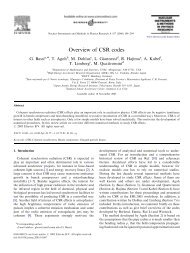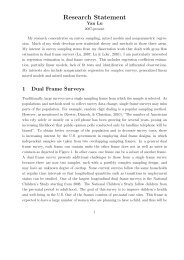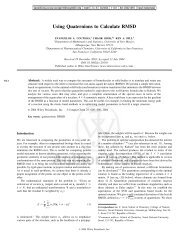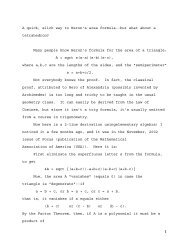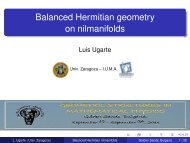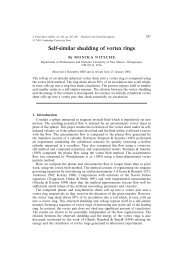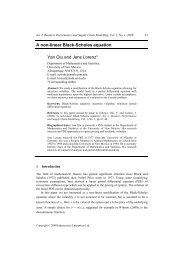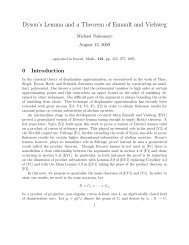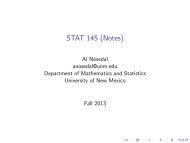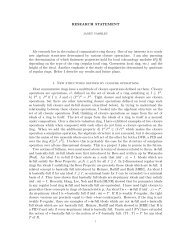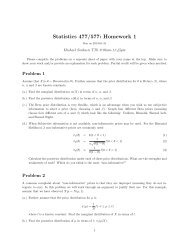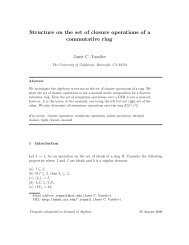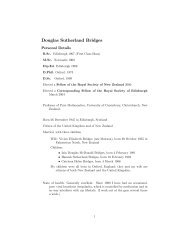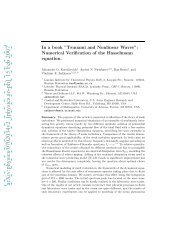OEO Office of Equal Opportunity - Department of Mathematics and ...
OEO Office of Equal Opportunity - Department of Mathematics and ...
OEO Office of Equal Opportunity - Department of Mathematics and ...
Create successful ePaper yourself
Turn your PDF publications into a flip-book with our unique Google optimized e-Paper software.
SPANISH AND PORTUGUESE 295<br />
Addresses the debate about the meaning <strong>of</strong> the modern <strong>and</strong><br />
the post-modern movements.<br />
Prerequisite: 311 or equivalent experience.<br />
*461. Topics in Brazilian Literature. (3, no limit) ∆<br />
Individual authors, genres <strong>and</strong> periods <strong>of</strong> Brazilian Literature.<br />
497. Undergraduate Problems. (1-6 to a maximum <strong>of</strong> 6) ∆<br />
Restriction: permission <strong>of</strong> instructor.<br />
511./311. Culture <strong>and</strong> Composition. (3)<br />
Students develop their vocabulary <strong>and</strong> improve their writing<br />
skills through the study <strong>of</strong> readings, films <strong>and</strong> music from<br />
the Portuguese-speaking world <strong>and</strong> through practice writing<br />
compositions.<br />
Prerequisite: 276.<br />
512./312. Culture <strong>and</strong> Conversation. (3)<br />
Students improve skills in oral communication, including<br />
pronunciation <strong>and</strong> intonation, through the study <strong>and</strong> performance<br />
<strong>of</strong> dramatic scenes, <strong>and</strong> the filming <strong>and</strong> editing <strong>of</strong><br />
those scenes.<br />
Prerequisite: 276<br />
514./414. Topics in Luso-Brazilian Literature <strong>and</strong><br />
Culture. (3, no limit) ∆<br />
An advanced language course emphasizing interdisciplinary<br />
themes in Luso-Brazilian literature <strong>and</strong> culture.<br />
Prerequisite: 311 or equivalent experience.<br />
515./415. Popular Brazilian Music I. (3)<br />
Survey <strong>of</strong> Brazilian popular music from its origins at the end <strong>of</strong><br />
the 19th century to 1950 concentrating on forms from the cultural<br />
centers in the south <strong>of</strong> Brazil as well as regional music.<br />
599. Master’s Thesis. (1-6)<br />
Offered on a CR/NC basis only.<br />
601. Literary Theory. (3)<br />
(Also <strong>of</strong>fered as SPAN 601.) This course will <strong>of</strong>fer either an<br />
overview <strong>of</strong> critical theory or an in-depth treatment <strong>of</strong> a critical<br />
school or individual theorist.<br />
699. Dissertation. (3-12)<br />
Offered on a CR/NC basis only.<br />
Spanish (SPAN)<br />
I. Language<br />
101. Elementary Spanish I. [Elementary Spanish.] (3)<br />
Beginning Spanish for students with no previous exposure<br />
to Spanish. Development <strong>of</strong> all four language skills, with<br />
emphasis on listening <strong>and</strong> speaking.<br />
102. Elementary Spanish II. [Elementary Spanish.] (3)<br />
Beginning Spanish for students who have completed 101 or<br />
equivalent. Continued development <strong>of</strong> four skills with emphasis<br />
on listening <strong>and</strong> speaking.<br />
103–104. Elementary Spanish Conversation<br />
I–Elementary Spanish Conversation II. [Elementary<br />
Spanish Conversation.] (1, 1)<br />
Supplementary courses to Spanish 101–102 for students<br />
interested in additional practice in speaking. Offered on<br />
CR/NC basis only.<br />
Pre- or corequisite: 101 or 102 or 111 or 112 or 275.<br />
ARTS AND<br />
SCIENCES<br />
516./416. Brazilian Cinema. (3)<br />
Survey <strong>of</strong> Brazilian cinema concentrating on the Cinema Novo<br />
movements <strong>of</strong> the 1950s <strong>and</strong> 1960s. Cinema is presented as<br />
an expression <strong>of</strong> national identity <strong>and</strong> is understood in relationship<br />
to literature <strong>and</strong> other cultural expressions.<br />
517./417. Popular Brazilian Music II. (3)<br />
Survey <strong>of</strong> Brazilian popular music from 1950 to 2000 concentrating<br />
on contemporary sounds from the cities <strong>of</strong> Rio de<br />
Janeiro <strong>and</strong> Sao Paulo as well as new music from Brazil’s<br />
other regions.<br />
521./421. Brazilian Theater. (3)<br />
A survey <strong>of</strong> 19th- <strong>and</strong> 20th-century drama by Brazil’s best<br />
known playwrights. Includes the study <strong>of</strong> plays <strong>and</strong> their<br />
performances, key moments <strong>and</strong> individuals in theater history<br />
<strong>and</strong> foreign influences.<br />
551. Graduate Problems. (1-6, to a maximum <strong>of</strong> 6) ∆<br />
Restriction: permission <strong>of</strong> instructor.<br />
557./457. Brazilian Literature Survey I. (3)<br />
Examines the historical <strong>and</strong> cultural movements that characterize<br />
the years 1500–1900 <strong>and</strong> the major works <strong>of</strong> Brazilian<br />
writers <strong>of</strong> those periods.<br />
Prerequisite: 311 or equivalent experience.<br />
558./458. Brazilian Literature Survey II. (3)<br />
Examines 20th century Brazilian literature within the context<br />
<strong>of</strong> historical <strong>and</strong> cultural movements in Brazil <strong>and</strong> Europe.<br />
Addresses the debate about the meaning <strong>of</strong> the modern <strong>and</strong><br />
the post-modern movements.<br />
Prerequisite: 311 or equivalent experience.<br />
561. History <strong>of</strong> the Portuguese Language. (3)<br />
The phonological, grammatical, <strong>and</strong> lexical development from<br />
Latin to Portuguese.<br />
570. Seminar in Luso-Brazilian Literature <strong>and</strong> Culture.<br />
(3, no limit) ∆<br />
Examines works <strong>of</strong> literature <strong>and</strong>/or culture <strong>and</strong> the scholarship<br />
written about them from a national or comparative<br />
framework.<br />
111. Elementary SHL I. [Elementary SHL Spanish.] (3)<br />
Beginning Spanish for students who grew up in a Spanishspeaking<br />
environment. Will build upon the language base<br />
which the students already possess. Development <strong>of</strong> all four<br />
language skills: reading, writing, listening <strong>and</strong> speaking.<br />
112. Elementary SHL II. [Elementary SHL Spanish.] (3)<br />
Beginning Spanish for heritage language students who have<br />
completed 111 or equivalent. Continued development <strong>of</strong> the<br />
four skills with an emphasis on reading <strong>and</strong> writing, vocabulary<br />
building <strong>and</strong> review <strong>of</strong> grammar.<br />
120. Workshop in Conversational Spanish. (1-3 to a<br />
maximum <strong>of</strong> 3) 1 ∆<br />
Conversational Spanish on the freshman <strong>and</strong> sophomore<br />
levels. For <strong>of</strong>f-campus students only, through the Division <strong>of</strong><br />
Continuing Education. May not be used to satisfy language<br />
requirements.<br />
200. Intermediate Spanish Abroad. (3)<br />
Intensive language study with emphasis on culture in an<br />
immersion situation. Tied to the University <strong>of</strong> New Mexico<br />
programs in Spain <strong>and</strong> Spanish America.<br />
201. Intermediate Spanish I. [Intermediate Spanish.] (3)<br />
Intermediate Spanish for students who have completed 102<br />
or equivalent. Review <strong>of</strong> grammar <strong>and</strong> further development<br />
<strong>of</strong> all four skills.<br />
202. Intermediate Spanish II. [Intermediate Spanish.] (3)<br />
Intermediate Spanish for students who have completed 201<br />
or equivalent. Continued development <strong>of</strong> all four skills with<br />
emphasis on reading.<br />
203. Spanish Conversation. (3)<br />
For students who have completed or are currently enrolled in<br />
Spanish 201, 202 or 276. Small classes designed to increase<br />
skills in speaking Spanish. Not for native speakers.<br />
Pre- or corequisite: 201 or 202 or 211 or 212 or 276.<br />
207. Conversational Spanish. (3) 1<br />
211. Intermediate SHL I. [Intermediate SHL Spanish.] (3)<br />
Intermediate Spanish for heritage language students who<br />
have completed 102 or equivalent. Review <strong>of</strong> grammar <strong>and</strong><br />
continued development <strong>of</strong> the four skills with an emphasis on<br />
literacy <strong>and</strong> speaking.<br />
UNM CATALOG 2006–2007 Symbols, page 611.



